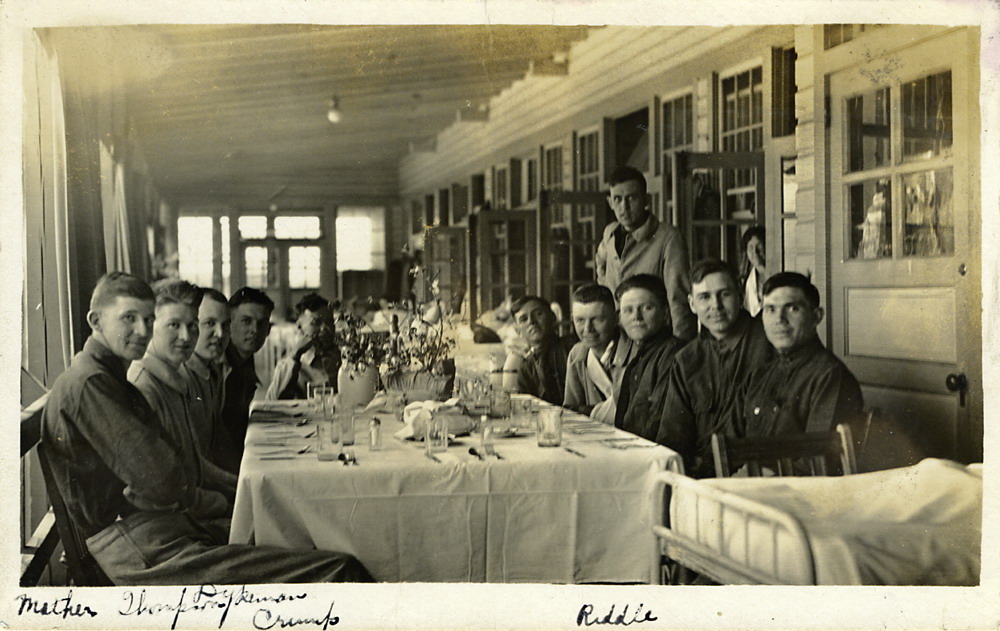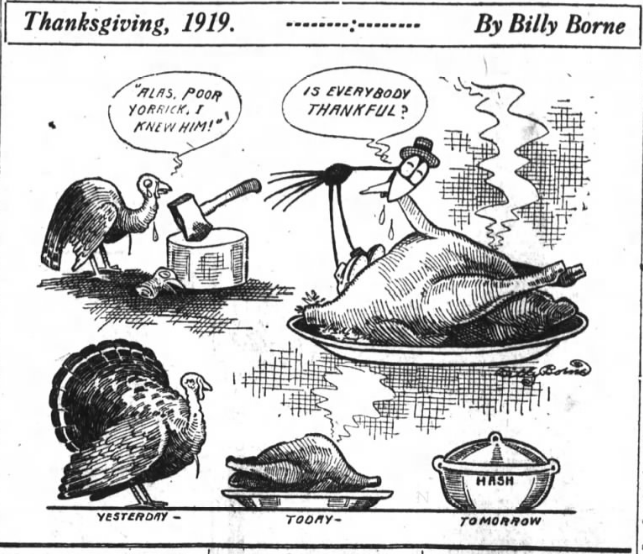“In this good year 1919, how much have we for which to be thankful!” declared North Carolina Gov. Thomas Walter Bickett, on Nov. 15. “Our soldiers, who on last Thanksgiving day, were far away in foreign lands have safely crossed the seas and are at home again in happiness and peace.”
The governor’s proclamation, delivered in Raleigh, was featured in the following day’s edition of The Sunday Citizen. His words represented both the state’s and the nation’s collective sigh of relief. A year prior, on Nov. 11, 1918, Germany surrendered, ending the Great War. Though victorious, American soldiers remained overseas during the 1918 holiday season. Meanwhile, U.S. citizens continued to sacrifice personal comforts to support the postwar efforts (see “Asheville Archives: Patriotic residents forgo turkey on Thanksgiving, 1918,” Nov. 22, 2018, Xpress).
By 1919, the country was ready to celebrate in traditional fashion. “[G]rocerymen from all over the city yesterday were unanimous in stating that bountiful provisions had been distributed to eager purchasers,” reported The Asheville Citizen on Thanksgiving Day. Residents, the paper continued, “will today spread the annual Thanksgiving dinner, with the piece de resistance — the American Thanksgiving bird — profusely surrounded with many luxurious dishes, made famous by their conspicuous entree on the annual a la carte, long anticipated and eagerly devoured[.]”
In addition to a hearty meal, the paper predicted many hunting parties that day scouring the local forests for “meat, rabbit and quail[.]” H.L. Finkelstein, anticipating an abundance of outdoor activities, promoted his pawnshop’s selection of guns and rifles in the previous day’s paper, touting: “Game hunting is bigger and more plentiful this year than ever — make your selection of either your shot gun or rifle from the big stock.” Finkelstein’s, which is still operational, offered new and used weapons ranging from $4.45 to $34.95 (or roughly $25 to $519 in today’s dollar).
Dances were also scheduled to take place throughout Asheville, “both at private homes and at the city dance hall,” the Thanksgiving Day paper reported. Meanwhile, the article continued, a number of the city’s “benevolent organizations,” announced plans to distribute food baskets to the less fortunate.
“Numerous persons yesterday were heard to comment upon the many things for which the American people have to thank the Almighty,” the article concluded. “The safe return of thousands of American youths who participated in the world war, absence of famine, and plagues were among those primarily pointed out.”
Of course, not all soldiers celebrated the holiday at home. In nearby Oteen, many returning servicemen received treatment at General Hospital No. 19 (see “Asheville Archives: Construction begins on U.S.A. General Hospital No. 19,” Oct. 23, 2018, Xpress). “A bountiful Thanksgiving turkey dinner was served yesterday to the sick boys, nurses, detachment men and officers … at the U.S. Army post,” The Asheville Citizen reported on Nov. 28, 1919.
Though separated from their families and still battling injuries and illnesses suffered during battle, the soldiers, according to the paper, appeared pleased and eager for their holiday meal:
“The tables with white table covers, and a bunch of galax leaves at every plate, big bowls filled high with nuts, fruits and cakes, presented a most beautiful scene, and for half an hour before the doors to the big mess hall were thrown open, big crowds of the boys stood in the halls looking in and making all sorts of jests as to what they could do for a whole plate of turkey and trimmings.”
Editor’s note: Peculiarities of spelling and punctuation are preserved from the original documents.







Many thanks(givings) to Mr. Calder for his ongoing local history series. He is a worthy successor to the late Mr. Neufeld as our designated Local Historian.
Just a note of interest on the cartoon – the skinny bird with the hat saying “Is everybody thankful” is supposed to represent the Vaudeville entertainer Ted Lewis – who was famous from the 1910’s -1930’s for his tilted top hat,his clarinet (which was more of a prop), and his trademark catchphrase “Is everybody happy?” The lamenting turkey is quoting Hamlet…